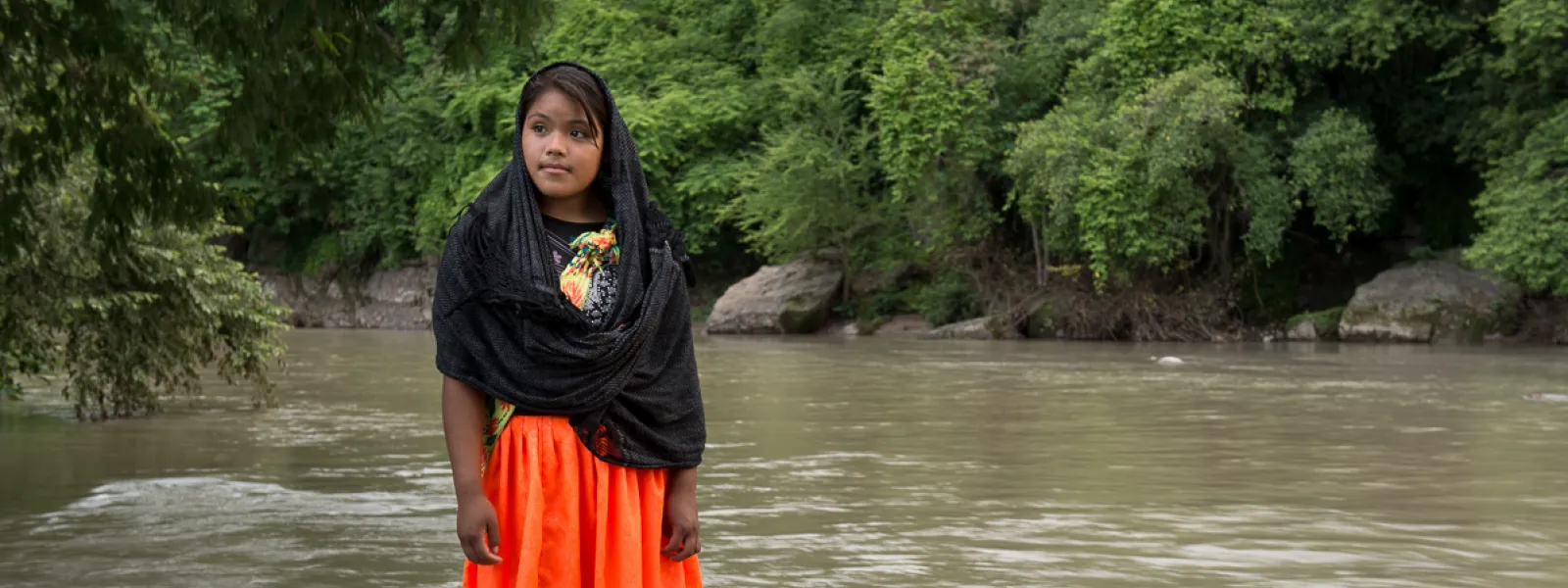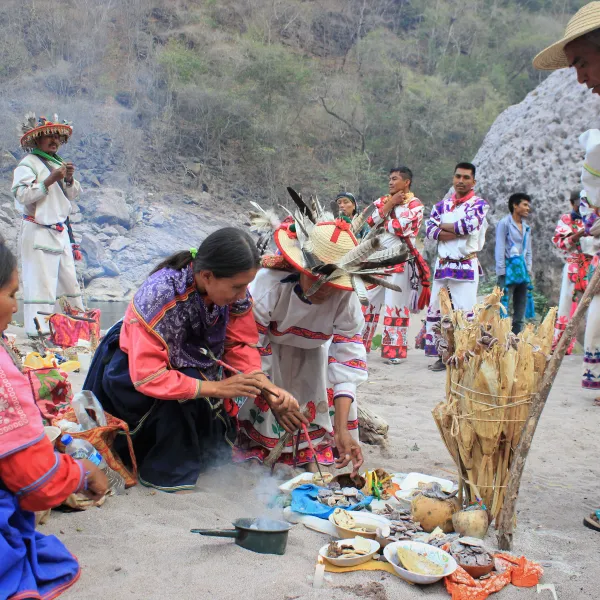
Project
Photo: Jaime RojoSaving the San Pedro Mezquital River from a destructive large dam
If built, the Las Cruces Dam would block the San Pedro Mezquital, the last free-flowing river in Mexico’s western Sierra Madre. It would affect fisheries, agriculture, livestock and other activities that nearly 12,000 families depend upon for survival.
The reservoir would flood the village of San Blasito and impact the town of Saycota. It would destroy an indigenous ceremonial center and 14 sacred sites. And it would restrict the water and nutrients that the river carries to Marismas Nacionales—the National Wetlands—which harbors one of the largest mangrove forests in Mexico.
In September 2014, the Mexican government approved the dam, despite the environmental impacts and without consulting and obtaining consent from affected indigenous communities.
The authorization ignored the technical opinions of national authorities, as well as recommendations from international organizations about the threats the project poses to the environment and human rights.
AIDA is working hand-in-hand with local organizations to support the communities affected by the project in their fight to have their rights respected.
Partners:

Related projects
Environmental Organizations Denounce Flaws and Impacts of the Costa del Pacifico (CIP) Mega-Resort at a Public Hearing (Spanish only)
PARA PUBLICACIÓN INMEDIATA: CEMDA, WildCoast, Conselva, Greenpeace, AIDA DENUNCIAN ORGANIZACIONES AMBIENTALES IRREGULARIDADES E IMPACTOS DEL PROYECTO CIP ESCUINAPA, DURANTE LA REUNIÓN DE INFORMACIÓN *Manifestación de impacto ambiental presentada de manera fragmentada, sólo es por 93 de las 2,600 hectáreas que abarca el proyecto *Preocupa a pescadores y ONG grave impacto a la actividad pesquera de la región *El proyecto no considera de manera adecuada la planeación de servicios básicos como el agua, y podría poner en riesgo los recursos hídricos de la región La Paz, BCS a 9 de marzo, 2010 - Durante la Reunión de Información realizada por la Unidad Coordinadora de Participación Social y Transparencia (UCPAST) de la Secretaría de Medio Ambiente y Recursos Naturales (Semarnat), varias organizaciones ambientalistas denunciaron nuevamente las irregularidades e impactos no contemplados en el proyecto “Infraestructura Básica del predio CIP Escuinapa, Sinaloa” promovido por el Fondo Nacional de Fomento al Turismo (FONATUR). La Manifestación de Impacto Ambiental (MIA) del proyecto se presentó de manera fragmentada, presentando análisis de impactos individuales en lugar de manera integral. Esto minimiza los graves impactos socio-ambientales del Proyecto en su conjunto, pues la MIA presentada solamente abarca 93.48 hectáreas, de las 2,600 hectáreas que comprende el Proyecto. El Centro Integralmente Planeado (CIP) Escuinapa es uno de los proyectos más ambiciosos del actual gobierno y estará ubicado al sur de Sinaloa, dentro de Marismas Nacionales. De acuerdo con Sofía Cortina, abogada de AIDA, “El CIP se construiría alrededor de una de las zonas de humedales más prioritarias para la conservación a nivel internacional, lo que ocasionará un severo desgaste ecológico a la región y un alto impacto a la actividad pesquera en el noroeste del país”. El Proyecto contempla una capacidad de 44,200 habitaciones, 4 campos de golf, 2 marinas, un malecón marítimo del palmar, paseo de los lagos interiores, ramblas comerciales y de entretenimiento, y otros servicios. Entre otras omisiones legales, las organizaciones destacaron las observaciones y comentarios que se han generado acerca de la MIA. A pesar que se invertirían 200 millones de pesos para estudios en materia ambiental para este proyecto (según manifestó FONATUR en una presentación del proyecto en la página1 del municipio de Escuinapa) “la evaluación del proyecto está fragmentada y no se expone la totalidad de los impactos ambientales que el CIP causaría” puntualizó Cortina. La MIA no incluyó estudios detallados sobre los impactos a especies endémicas como reptiles, peces, moluscos y sobretodo, acerca de las más de 250 especies de aves, como es obligación de acuerdo con la NOM-059-SEMARNAT-2003. A la lista de omisiones, se suma que en la MIA no se señala una planeación detallada para la provisión de los servicios básicos como son el agua y la recolección de desechos sólidos, siendo este último un grave problema actual para el municipio Escuinapa ya que no cuenta con un relleno sanitario. Adicionalmente, “no se propusieron las medidas de mitigación adecuadas basadas en los criterios de la Convención Ramsar, tratado internacional para la conservación y uso racional de los humedales y sus recursos, de la cual México forma parte y es uno de los países con mayor número de humedales registrados, incluyendo Marismas Nacionales”, comentó Sandra Moguel, abogada del Centro Mexicano de Derecho Ambiental. “Este ecosistema cuenta con un valor especial para la preservación de la diversidad genética y ecológica de la región, es reconocida como hábitat del jaguar, representa alrededor del 10% del total de manglares en México y más de 90 especies de fauna de las cuales 73 se encuentran amenazadas o en peligro de extinción, y es el hábitat de una población de 20,000 aves acuáticas y refugio invernal para más de 100,000 aves acuáticas migratorias”, continuó Moguel. El CEMDA y la Asociación Interamericana para la Defensa del Ambiente (AIDA), junto con Greenpeace México, Wildcoast, Conselva y Red Manglar, presentaron en abril del 2009, una petición al Secretariado Ramsar informando del incumplimiento del Gobierno Federal en su compromiso como integrante de la Convención, de proteger los humedales mexicanos enlistados en Ramsar. Al igual que Marismas Nacionales, la laguna Huizache-Caimanero, ubicada en el municipio de Rosario, Sinaloa, es un sitio Ramsar de gran importancia para la actividad pesquera de la región y el cual es amenazado a la vez por cuatro proyectos de alto impacto. Actualmente se espera la visita de una misión de verificación internacional. Tanto pescadores de Sinaloa y Nayarit, como ONG y pobladores, han manifestado su preocupación por una posible resolución a favor del desarrollo del CIP en Escuinapa, debido a que temen la afectación a los ingresos económicos de la actividad pesquera de los lugareños por los impactos sobre el ecosistema que hasta ahora es regulada en gran parte por la existencia de los humedales y manglares de Marismas Nacionales. Por último Moguel señaló de gran importancia, la participación de las organizaciones ambientales en la Reunión Pública de Información, como ejercicio de involucramiento público en la evaluación de impacto ambiental, para el empoderamiento de la ciudadanía en la toma de decisiones respecto al uso y aprovechamiento de sus recursos naturales. PARA MAYOR INFORMACIÓN CONTACTAR: Claudia Gómez-Portugal M. Directora de Comunicación 01 (55) 55256136 / 01 (55) 52863323 [email protected] Sofìa Cortina Segovia Asesora Legal 01 (612) 1221369 [email protected]
Read moreCanadian Supreme Court prohibits project splitting and guarantees public participation in environmental assessments (Spanish text only)
PARA PUBLICACIÓN INMEDIATA: CONTACTO: Jacob Kopas: [email protected] Teléfonos: (+57) 1-338-1277 / 320-316-0379 Corte Suprema de Canadá prohíbe fragmentar proyectos mineros y rectifica la obligatoriedad de evaluaciones de impacto ambiental integrales y con participación pública Ottawa, Canadá - En un cambio jurisprudencial fundamental, el 21 de enero la Corte Suprema de Canadá determinó que los grandes proyectos mineros están obligados a tener una evaluación de impacto ambiental comprehensiva, sin fragmentar el proyecto, y que garantice la participación pública. La sentencia concluye que las autoridades canadienses, al realizar la evaluación ambiental del proyecto minero Red Chris (un inmenso proyecto minero de oro y cobre a cielo abierto), lo fragmentaron ilegalmente impidiendo así conocer el verdadero impacto ambiental de la obra. “Celebramos enormemente esta decisión de la Corte Suprema de Canadá, que debería ser replicada por los gobiernos y las empresas mineras, especialmente las canadienses, con grandes intereses en la región”, dijo Jacob Kopas, abogado de la Asociación Interamericana para la Defensa del Ambiente (AIDA). AIDA, CELA y varias organizaciones presentaron un escrito ante la Corte, apoyando la demanda presentada por Ecojustice y otros grupos ambientalistas, resaltando entre otros, que la autorización de este proyecto también desconoce el derecho internacional ambiental. El proyecto “Red Chris” procesaría 30,000 toneladas métricas de mineral al día y arrojaría los desechos tóxicos en un área remota y prístina de la provincia de Columbia Británica, Canadá, habitada por grandes mamíferos y que es un importante sitio para la reproducción de salmón. Ante los posibles riesgos irreparables que esta mina a cielo abierto implica para esta área y sus pobladores, una evaluación comprehensiva es sin duda, un requisito esencial antes de autorizarlo. El máximo tribunal canadiense concluyó que el gobierno federal violó las normas aplicables al autorizar este proyecto de manera fragmentada, y también al impedir la participación pública activa de las comunidades y los grupos locales en la evaluación de impactos ambientales para grandes proyectos, como la minería. Estos dos elementos son esenciales dado que proyectos como la mina Red Chris no sólo interesan a los inversionistas y al gobierno, sino también a todas las comunidades locales que de múltiples maneras tienen un interés en las áreas a afectarse. “En el hemisferio hemos sido testigos de innumerables proyectos con inmensos impactos ambientales y sociales, que desafortunadamente se presentan y evalúan por partes, las minas a cielo abierto son un ejemplo reiterado, por lo que esta sentencia es vital para la región”, dijo Astrid Puentes, Co-Directora de AIDA. “Además, la decisión de la Corte está de acuerdo con normas ambientales internacionales, contribuye a prevenir daños ambientales irreparables y respeta el derecho humano a la participación pública, constituyéndose en un gran ejemplo a seguir”. ## Para mayor información ir a: www.aida-americas.org Enlace de información de otras organizaciones: www.ecojustice.ca; www.cela.ca
Read more
Environmental Defense Guide
The purpose of this publication is to promote the use of the Inter-American System of Human Rights for addressing environmental degradation that causes human rights violations. Within this guide we provide the legal strategies and arguments necessary to use the System effectively and properly. Our goal with this publication and our work in general, is to strengthen people’s capacity to defend their individual and collective right to a healthy environment through the proper development, implementation and fulfillment of domestic and international law. With the publication and widespread distribution of the English-language edition of the Guide, we hope to significantly advance this goal. Read and download the guide
Read more